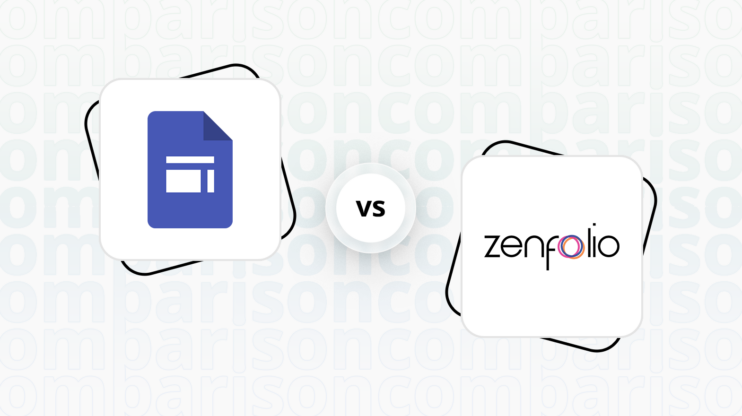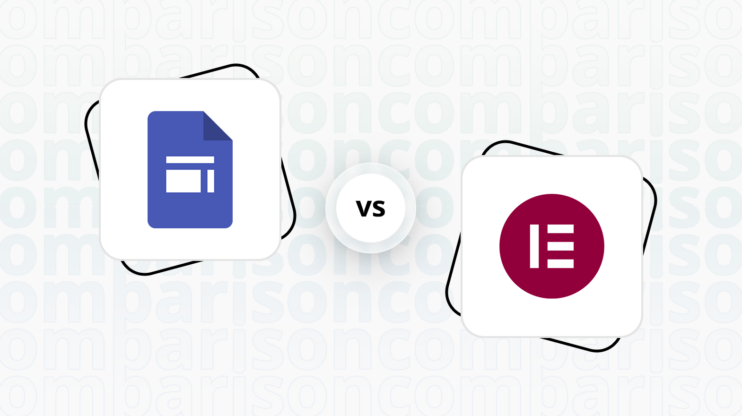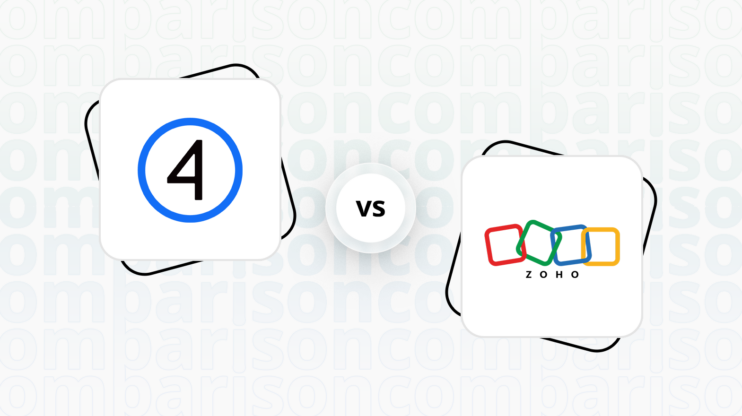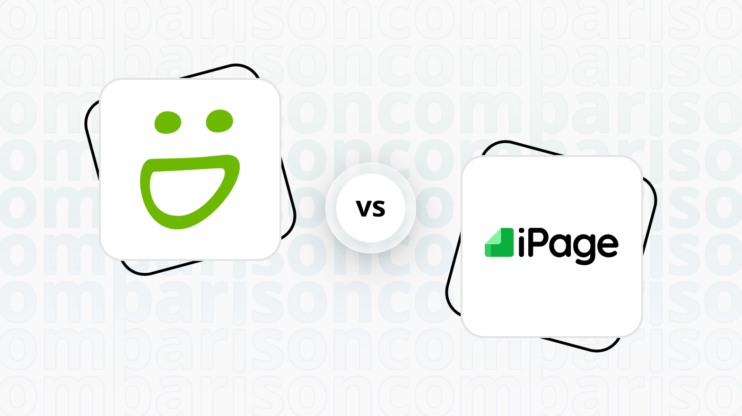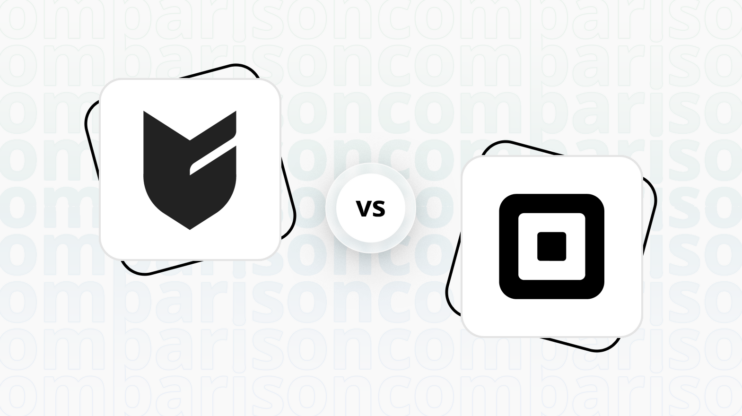Final verdict
Google Sites vs Carbonmade: Both platforms cater to different user needs, with Google Sites being more suitable for collaborative projects and small business websites, while Carbonmade excels in providing a simple, customizable portfolio creation experience for creatives.
-
Google Sites (Overall Grade: 5.6/10)
is a versatile website builder that integrates seamlessly with other Google services, making it ideal for team projects and small business websites. It offers a user-friendly drag-and-drop interface, a variety of templates, and robust security features. However, it lacks advanced design customization and ecommerce capabilities, which may limit its appeal for users seeking more sophisticated website functionalities. -
Carbonmade (Overall Grade: 4.4/10)
is designed specifically for creatives who want to showcase their work online without needing coding skills. It offers highly customizable layouts, responsive designs, and support for unlimited uploads, including 4K videos. While it excels in ease of use and design flexibility, it lacks ecommerce features, plugins, and integrations, making it less suitable for users who need a more comprehensive website solution.

|
|
|
|---|---|---|
|
Design functionalities & templates |
4.9 |
7.3 |
|
Ease of use |
8.3 |
8.3 |
|
Ecommerce |
1.8 |
0 |
|
Website Editors |
7.0 |
7.6 |
|
Product testing options |
6.9 |
7.2 |
|
Price |
8.1 |
7.9 |
|
Hosting quality |
8.2 |
6.1 |
|
Website speed optimization |
3.3 |
5.0 |
|
Plugins and integrations |
6.4 |
0 |
|
Marketing features |
2.6 |
1.0 |
|
Customer support |
7.2 |
5.8 |
|
Security |
9.3 |
5.8 |
|
User Management |
7.8 |
2.8 |
Best for ecommerce
 1.8
1.8
 0
0
Verdict
: Neither Google Sites nor Carbonmade is suitable for serious ecommerce. Google Sites offers minimal ecommerce functionalities through third-party integrations, while Carbonmade does not support ecommerce at all.
-
Google Sites
: Google Sites allows for some ecommerce functionalities through third-party integrations. Users can embed payment buttons from services like PayPal or link to external checkout pages. However, it lacks built-in ecommerce features, making it a less viable option for robust ecommerce needs. When comparing Google Sites vs Carbonmade, Google Sites has a slight edge due to its ability to integrate third-party tools. -
Carbonmade
: Carbonmade does not support ecommerce features. It is designed specifically for creatives to showcase their work online, making it unsuitable for any ecommerce activities. In the context of Google Sites vs Carbonmade, Carbonmade falls short in providing any ecommerce capabilities.
Best for informational & business websites
 7.2
7.2
 5.9
5.9
Verdict
: Google Sites is the better choice for informational and business websites due to its ease of use, integration with Google services, and robust security features. Carbonmade, while excellent for creative portfolios, lacks the versatility and advanced features needed for broader business applications.
-
Google Sites
: Google Sites is a user-friendly platform that excels in creating simple, collaborative websites. Its integration with Google Workspace makes it ideal for team projects and small business websites. The platform’s ease of use, combined with a variety of templates and strong security measures, makes it a solid choice for informational websites. Google Sites scores 7.2 in this category. -
Carbonmade
: Carbonmade is tailored for creative professionals looking to showcase their work online. It offers highly customizable layouts and an intuitive interface, making it perfect for portfolios. However, its lack of plugins and integrations, along with limited business-oriented features, makes it less suitable for broader informational and business websites. Carbonmade scores 5.9 in this category.
Detailed comparison
Design functionalities & templates
Design FunctionalitiesRepresents how well each platform allows for creative design and customization of websites.Score Components:
- Template Variety (30%): Range and quality of design templates.
- Customization (30%): Flexibility and options for design alterations.
- User Interface (20%): Ease and intuitiveness of the design process.
- Responsiveness (10%): Adaptability to different devices and screen sizes.
- Innovation (10%): Unique design features and tools.
 4.9
4.9
 7.3
7.3
🏆
Winner: Carbonmade.
If you’re a creative professional looking for a platform that offers more customization and advanced design features, Carbonmade is the better choice.
Google Sites offers a limited number of templates (around 17) suitable for various purposes, from personal blogs to business websites, with both free and premium options available. These templates are designed for user engagement, simplicity, and functionality, allowing for customization to meet specific needs. However, compared to other website builders, Google Sites might offer less variety in templates and design customization options.
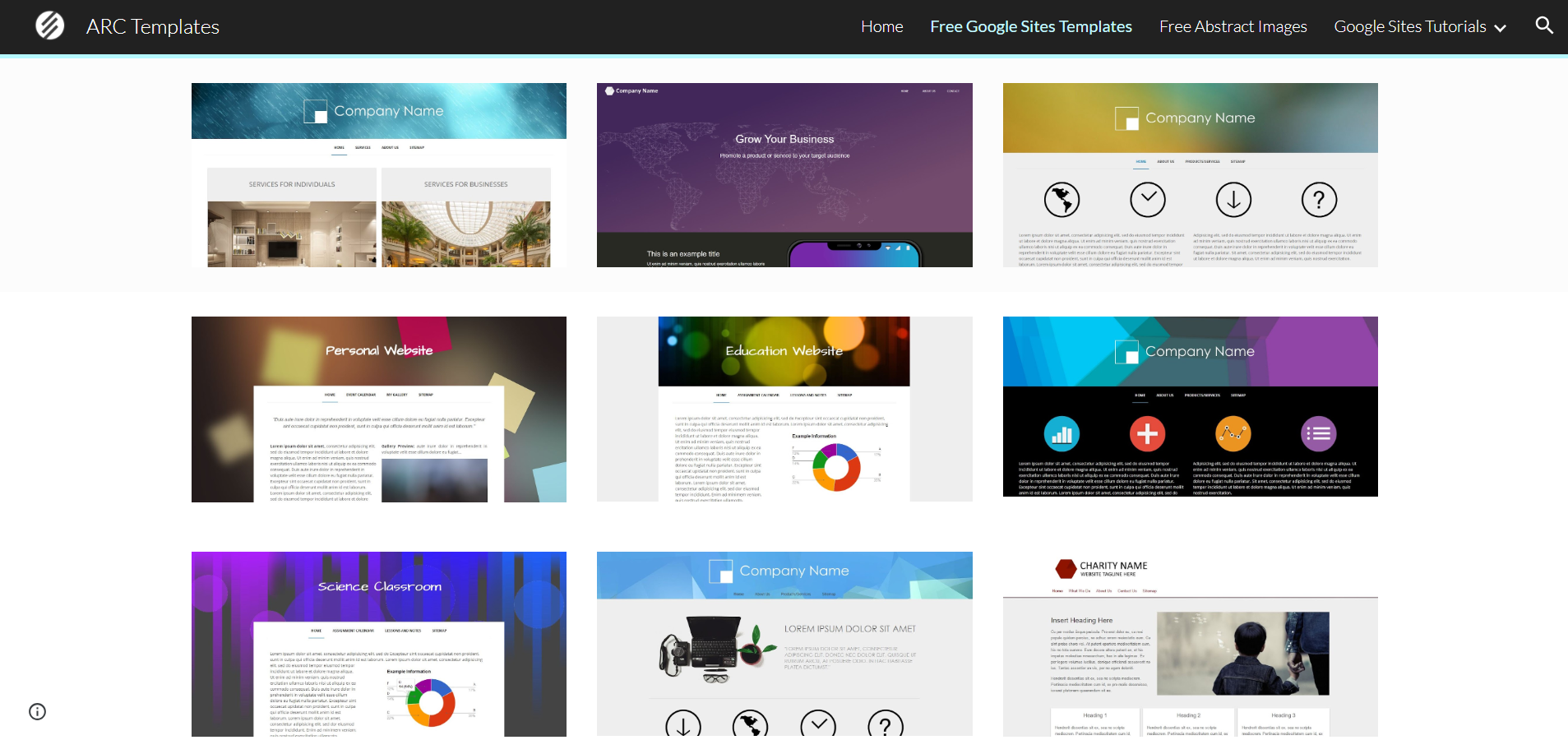

Carbonmade, on the other hand, does not use traditional templates. Instead, the platform creates a personalized portfolio website based on the inputs of the users. This approach allows for a high degree of customization flexibility tailored for creatives, enabling personalized, profession-specific layouts, responsive designs across devices, and support for unlimited uploads, including 4K videos.
Get a head start on website creation with AI
Create a custom website tailored to your business needs 10X faster with 10Web AI Website Builder!
Ease of use
Ease of useReflects the platform’s overall user-friendliness.Score
Components:
- Learning curve (40%): Quickness and ease of getting started.
- Interface design (30%): Simplicity and intuitiveness of layout.
- User guidance (20%): Quality of tutorials and support.
- Flexibility (10%): Adaptability to various user skills.
 8.3
8.3
 8.3
8.3
🏆 Tie: Google Sites and Carbonmade
. Both Google Sites and Carbonmade score an 8.3 in ease of use, making them equally user-friendly. Google Sites offers a straightforward drag-and-drop interface and seamless integration with Google services, making it ideal for users familiar with the Google ecosystem. Carbonmade, on the other hand, provides a simple and intuitive platform specifically designed for creatives, featuring customizable layouts and portfolio-specific tools.
Learning Resources
🏆 Winner: Google Sites
. Google Sites provides a wide array of learning resources, including practical guides for educators and comprehensive digital skill development programs. Its integration with other Google services enhances its utility. Carbonmade also offers comprehensive video tutorials and a help center, but Google Sites’ broader range of resources gives it an edge.
For ecommerce
EcommerceMeasures the platform’s effectiveness in supporting online business activities.Score Components:
- Ecommerce themes and templates (20%): Variety and design of templates.
- Product management (25%): Ease of managing and organizing products.
- Payment options (25%): Variety and convenience of payment methods.
- Ecommerce features (20%): Features for managing an ecommerce store.
- Integration (10%): Compatibility with external e-commerce tools and services.
 1.8
1.8
 0
0
When it comes to ecommerce, both Google Sites and Carbonmade fall short compared to dedicated ecommerce platforms. Google Sites allows for some ecommerce functionalities through third-party integrations, while Carbonmade does not support ecommerce at all.

|
|
|
|---|---|---|
|
Ecommerce themes and templates |
0.0 |
0.0 |
|
Product page customization |
0.0 |
0.0 |
|
Payment processing and commissions |
1.0 |
0.0 |
|
POS capabilities |
0.0 |
0.0 |
|
Payment gateways |
2.0 |
0.0 |
|
Product numbers |
0.0 |
0.0 |
|
Additional ecommerce features |
0.5 |
0.0 |
Google Sites ecommerce features:
- No built-in ecommerce features
- Can integrate third-party tools or widgets
- Possible to link to external ecommerce platforms
- Can use Google Forms for order forms
- Integration with payment services like PayPal
Carbonmade ecommerce features:
- No ecommerce features provided
Ecommerce themes & templates
Google Sites does not have any ecommerce templates. Similarly, Carbonmade does not offer any templates for ecommerce purposes.
Product page customization
Google Sites lacks any product page customization features. Products can be listed by embedding third-party platforms, and all customization must be done within those platforms. Carbonmade does not have ecommerce capabilities, thus it’s not possible to have product pages.
Payment processing
Google Sites allows for the integration of payment gateways using external tools or links, not through native features. This can be done by embedding HTML code for payment buttons from services like PayPal, Square, or Stripe, or by linking to an external checkout page. However, Google Sites doesn’t offer the comprehensive ecommerce capabilities that dedicated platforms provide. Carbonmade does not have payment processing capabilities.
In summary, if you need basic ecommerce functionalities and are willing to use third-party integrations, Google Sites might be a viable option. However, for a more robust ecommerce solution, you would need to look beyond these two platforms.
Website Editors
Website EditorsEvaluates the platforms’ website building and editing capabilities.Score Components:
- Customization tools (40%): Range and power of editing features.
- Editor usability (30%): User experience within the editor.
- Design flexibility (20%): Freedom in layout and design changes.
- Update and maintenance ease (10%): Simplicity of updating and maintaining the site.
 7.0
7.0
 7.6
7.6
🏆
Winner: Carbonmade
. Carbonmade, with a score of 7.6, offers a range of features designed for creatives to build personalized, professional online portfolios without requiring coding knowledge. Its editor provides responsive design across devices, 4K video support, unlimited image and video uploads, and premade blocks for customization. The platform also includes unique features such as private portfolios, a before/after block, gallery slideshows, and a talent pool to connect with other creatives and potential clients.
Google Sites’ editor, scoring 7.0, offers a user-friendly website builder that allows users to create and design websites without needing coding knowledge. With its drag-and-drop interface, users can easily add, customize, and arrange elements such as text, images, and videos on their web pages. It also provides a variety of templates and design options to help users get started quickly and ensure their site looks professional. However, its simplicity comes with limitations, such as a lack of advanced design customization options and limited third-party integrations.
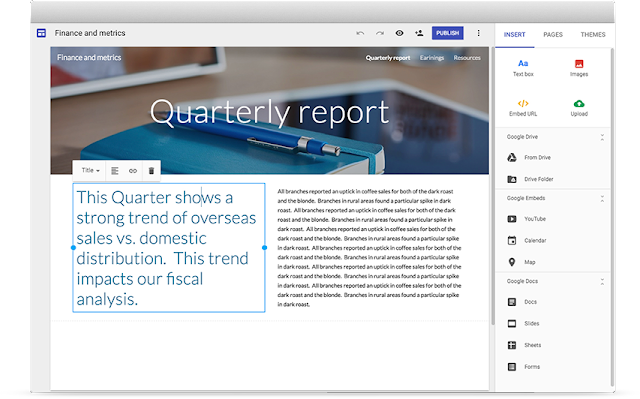
Mobile editor/app
 0
0
 0
0
🏆
Winner: None
. Both Google Sites and Carbonmade do not offer a dedicated mobile editor app. This means that users of these platforms will need to rely on desktop versions for creating and managing their websites. While both platforms excel in their respective areas—Google Sites for its integration with Google services and ease of use, and Carbonmade for its focus on creative portfolios—they lack the convenience of mobile editing capabilities. This could be a significant drawback for users who prefer or require the flexibility to make website adjustments on the go.
Product testing options
Product Testing OptionsAssesses the options for trying out platform features before commitment.Score Components:
- Trial quality (40%): Extent and usefulness of the trial or free version.
- Feature accessibility (30%): How many features are available to test.
- Trial duration (20%): Length of the trial period.
- Ease of transition (10%): Smoothness of moving from trial to paid plans.
 6.9
6.9
 7.2
7.2
Overall Result
:
Carbonmade leads
. Carbonmade scores 7.2, slightly higher than Google Sites’ 6.9. Carbonmade offers a trial version where all features can be tested, providing a comprehensive evaluation period. Google Sites, while offering a free version and a 14-day trial, only allows testing of some premium features within the trial period.

|
|
|
|---|---|---|
|
Free Plan |
Yes | No |
|
Trial Duration |
14 days | Yes |
|
Testing Premium Features |
Some features within trial | All features within trial |
Price
PriceLooks at the cost-effectiveness and value for money of each platform.Score Components:
- Plan value (40%): What each pricing tier offers.
- Transparency and clarity (30%): Clearness of pricing structures.
- Flexibility of plans (20%): Range of options to suit different budgets.
- Hidden costs (10%): Additional expenses not included in the plan.
 8.1
8.1
 7.9
7.9
Google Sites offers a range of plans suitable for various business sizes, including an enterprise option with custom pricing, while Carbonmade provides three straightforward plans without an enterprise option.

|
|
|
|---|---|---|
|
$0-$10 |
Business Starter ($7.20/month): This plan includes basic features suitable for individuals or small businesses, offering professional email through Gmail, 30GB of storage per user, and video meetings for up to 100 participants. It allows to manage 1 website and there is no limitation on number of pages. Value for Price: 6.0 |
BEGINNER ($9/month): 8 Projects, Unlimited images/videos, Basic Blocks, Limited Support, 3 Navigations, SD Video, Audio Uploads Value for Price: 5.0 |
|
$10-$20 |
Business Standard ($14.40/month): Suitable for growing businesses, this plan provides 2 TB of storage per user, video meeting capacity for up to 150 participants with recording features, and access to smart booking pages and shared drives. It allows to manage 1 website and there is no limitation on number of pages. Value for Price: 7.5 |
PRO ($12/month): 50 Projects, More Portfolio Grids, Premium Blocks, Unbranded, Portfolio statistics, Custom Pages, Private Portfolio, Unlimited images/videos, 5 Navigations, HD Video & Audio, Priority Support Value for Price: 7.0 |
|
$20+ |
Business Plus ($21.60/month): Designed for larger businesses needing more robust capabilities, offering 5 TB of storage per user, advanced security options, and video meetings for up to 500 participants. It allows to manage 1 website and there is no limitation on number of pages. Value for Price: 8.5 |
UNLIMITED ($22/month): UNLIMITED projects/pages, Everything else, All features in PRO, Extra Karma Value for Price: 8.5 |
location. As a result in rare cases the prices displayed here can differ from the ones you see on their
websites.
Hosting quality
Hosting
qualityExamines the reliability and performance of the hosting solutions.Score Components:
- Uptime (40%): Consistency and reliability of website availability.
- Speed (30%): Loading times and performance.
- Bandwidth and storage (20%): Sufficiency of resources provided.
- Data centers (10%): Quality and distribution of hosting infrastructure.
 8.2
8.2
 6.1
6.1
🏆
Winner: Google Sites
Google Sites offers reliable cloud-based managed hosting with a 99.9% uptime guarantee and extensive global data centers. Carbonmade, while providing unlimited storage, lacks disclosed uptime statistics and data center locations, making Google Sites the more dependable choice.

|
|
|
|---|---|---|
|
Do they offer hosting? |
Yes, basic storage with 100MB free per site, upgradeable via Google Workspace |
Yes, with unlimited storage |
|
Data Centers: |
Google operates a total of 21 data centers across the globe: 2 in Asia, 5 in Europe, 13 in US and 1 in South America |
Carbonmade does not disclose the locations of its data centers |
|
Type of hosting: |
Cloud based managed hosting |
Managed Hosting |
|
Uptime: |
99.9% |
Carbonmade does not disclose uptime statistics |
|
Uptime Guarantee: |
Yes, 99.9% |
Carbonmade does not have an uptime guarantee |
Website Speed Optimization
Website Speed OptimizationEvaluates optimization of website loading timesScore Components:
- PageSpeed Score (30%): Google’s score indicating performance optimization.
- Loading Time (30%): The average time until a website is fully interactive.
- Mobile Optimization (15%): Optimization effectiveness for mobile devices.
- Resource Optimization (15%): Optimizing images, scripts, and other heavy resources.
- CDN Usage (10%): Use of CDN to enhance speed across geolocations.
 3.3
3.3
 5.0
5.0
🏆 Winner: Carbonmade
. While both Google Sites and Carbonmade have their strengths, Carbonmade edges out Google Sites in terms of website speed optimization.

|
|
|
|---|---|---|
|
Focus |
Automated Optimization, CDN, Mobile Optimization, Browser Caching, Code Minification, Use of AMP |
Not specified |
|
Performance Tools |
Integrated Google services |
Not specified |
|
Key Strategies |
Automated Optimization, CDN, Mobile Optimization, Browser Caching, Code Minification, Use of AMP |
Not specified |
|
Load Times |
Not disclosed |
Varies depending on optimization |
|
Page Speed Scores Range |
Not disclosed |
Varies depending on optimization |
|
Core Web Vitals Improvement |
Emphasis on LCP, FID, CLS improvements |
Not specified |
Google Sites offers a range of automated optimization features, including CDN, mobile optimization, browser caching, code minification, and the use of AMP. These strategies are designed to improve load times and overall website performance. However, Google does not disclose specific statistics about website PageSpeed scores or load times, making it difficult to gauge the actual performance improvements.
Carbonmade, on the other hand, does not provide detailed information on its speed optimization features or Core Web Vitals improvements. However, user feedback and general performance indicate that load times and PageSpeed scores vary depending on the level of optimization applied by the user. This flexibility allows for potentially better performance, giving Carbonmade a slight edge in this comparison.
In summary, while Google Sites offers a comprehensive set of automated optimization features, the lack of disclosed performance metrics makes it challenging to assess its effectiveness. Carbonmade, despite not specifying its optimization strategies, provides a more flexible approach that can lead to better performance depending on user optimization efforts.
Get a head start on website creation with AI
Create a custom website tailored to your business needs 10X faster with 10Web AI Website Builder!
Plugins and integrations
Plugins and integrationsMeasures the range and effectiveness of additional plugins and integrations.Score Components:
- Variety of options (40%): Range of available add-ons.
- Integration smoothness (30%): Ease of integrating plugins into the site.
- Quality of plugins (20%): Functionality and reliability of the options.
- Custom integration capabilities (10%): Support for custom or third-party integrations.
 6.4
6.4
 0
0
🏆 Winner: Google Sites.
Google Sites scores 6.4, offering a range of plugins and integrations that significantly enhance its basic functionalities. Users can integrate social media feeds, reviews, e-commerce elements, and interactive content, making it a versatile choice for various website needs. Carbonmade, on the other hand, does not support any plugins or integrations, focusing solely on simplicity and ease of use for creating online portfolios.
Google Sites’ ability to integrate with tools like Elfsight and Common Ninja provides users with a more dynamic and engaging website experience, whereas Carbonmade’s lack of plugin support limits its extensibility.

Marketing Features
Design FunctionalitiesRepresents how well each platform allows for creative design and customization of websites.Score Components:
- Template Variety (30%): Range and quality of design templates.
- Customization (30%): Flexibility and options for design alterations.
- User Interface (20%): Ease and intuitiveness of the design process.
- Responsiveness (10%): Adaptability to different devices and screen sizes.
- Innovation (10%): Unique design features and tools.
 2.6
2.6
 1.0
1.0
🏆
Overall Winner: Google Sites
. Google Sites offers basic SEO settings and Google Analytics integration, making it slightly more equipped for marketing than Carbonmade, which lacks SEO features and has limited analytics capabilities.

|
|
|
|---|---|---|
|
SEO Tools |
Basic SEO settings |
No |
|
Email Marketing |
No |
No |
|
Blogging |
No |
No |
|
Social Media Integration |
Basic integration through links and widgets |
Basic integration through social network links |
|
Analytics and Reporting |
Google Analytics integration |
Custom analytics within control panel |
|
Ads and Promotions |
No |
No |
Customer Support
Customer supportEvaluates the quality and availability of support options.Score Components:
- Response time (40%): Speed of support responses.
- Support quality (30%): Effectiveness and helpfulness of the support.
- Availability (20%): Range of support channels (phone, chat, email).
- Resource richness (10%): Quality of self-help and educational materials.
 7.2
7.2
 5.8
5.8
🏆 Winner: Google Sites
. In the comparison of Google Sites vs Carbonmade, Google Sites takes the lead with its more comprehensive support options. Google Sites offers a range of self-service resources, including a Help Center and community forums, which are accessible to all users. For Google Workspace customers, direct support is available through phone, email, and live chat, with 24/7 support for critical issues depending on the subscription tier.
Carbonmade, on the other hand, provides support primarily through a ticket-based system. While response times are generally quick, the lack of live customer support means users may experience delays in getting immediate assistance. This makes Google Sites a more robust option for users seeking reliable and readily available support.
Security
SecurityLooks at the platforms’ security measures and data protection.Score Components:
- Data protection (40%): Safeguards for user and customer data.
- SSL and encryption (30%): Implementation of secure connections.
- Compliance (20%): Adherence to industry security standards.
- Regular updates (10%): Frequency of security updates and patches.
 9.3
9.3
 5.8
5.8
🏆
Winner: Google Sites
. Google Sites excels in security with a comprehensive suite of features, including SSL encryption, two-factor authentication, and automatic malware scanning. The platform benefits from Google’s robust infrastructure, which includes DDoS protection and regular security updates, ensuring a secure environment for both website creators and visitors. Google Sites’ adherence to international data protection standards further underscores its commitment to maintaining high security and privacy standards.
Carbonmade, while excellent for creating and managing online portfolios, does not emphasize security measures to the same extent. The platform focuses on the simplicity and ease of use for creatives, which may leave some security aspects less robust compared to Google Sites. Therefore, for users prioritizing security, Google Sites is the superior choice.
AI Capabilities
AI capabilitiesMeasures the effectiveness of AI-driven features and tools.Score Components:
- Automation efficiency (40%): Impact of AI on streamlining processes.
- Personalization (30%): AI-driven customization for users or customers.
- AI-Assisted design (20%): Role of AI in website design and functionality.
- Data analysis (10%): Use of AI in interpreting user data and analytics.
 0
0
 0
0

|
|
|
|---|---|---|
|
AI Builder |
None |
None |
|
AI Ecommerce Features |
None |
None |
|
AI Content Generation |
None |
None |
|
Additional AI Features |
None |
None |
🏆 Winner: None
. Neither Google Sites nor Carbonmade offer any AI capabilities. Both platforms focus on providing user-friendly website building tools without incorporating AI features. Google Sites is designed for easy integration with other Google services and collaborative site creation, while Carbonmade emphasizes simplicity and customization for creative professionals.
User Management
User ManagementAssesses the platforms’ capabilities in managing user roles, permissions, and accessibility.Score Components:
- Role Customization (40%): Flexibility in creating and defining user roles and
permissions. - Ease of Management (30%): User interface and tools for managing users.
- Access Control (20%): Effectiveness of access control measures for different user
levels. - Scalability (10%): Ability to manage a growing number of users efficiently.
 7.8
7.8
 2.8
2.8
🏆 Winner: Google Sites
. When it comes to managing users, Google Sites offers a more flexible and collaborative environment compared to Carbonmade.
- Google Sites allows multiple users to collaborate with different roles, including Owners, who have full control, and Editors, who can modify content but not site settings. There’s no strict limit on the number of users who can edit a site, allowing flexibility in management and development. Viewers can only see the site, with no editing permissions.
- Carbonmade, on the other hand, allows only one user to manage and edit a website, which can be limiting for teams or collaborative projects.
Both platforms support simultaneous editing, but Google Sites stands out for its ability to accommodate multiple users with varied levels of access and control.
Google Sites User Management:
| Role | Description | Access Highlights |
|---|---|---|
| Owner | Full control over site | Manage pages, settings, and user roles. Full editing and administrative access. |
| Editor | Modify content but not site settings | Add/edit pages, modify text and images. Cannot manage site settings or user roles. |
| Viewer | View-only access | Can view the site but cannot make any changes. |
Carbonmade User Management:
| Role | Description | Access Highlights |
|---|---|---|
| Single User | Full control over site | Manage and edit the entire website. No collaborative roles available. |
Additional Features

|
|
|
|---|---|---|
|
SSL Certificate |
✓ |
X |
|
Custom Domain |
✓ |
✓ |
|
Free Custom Domain Included |
✓ |
X |
|
International Domains |
✓ |
✓ |
|
Mobile Responsive |
✓ |
✓ |
|
Page Speed |
✓ |
✓ |
|
Website Builder Mobile App |
X |
X |
|
Convert a Website To An App |
X |
X |
|
Website Analytics |
✓ |
✓ |
|
Multilingual Sites |
✓ |
✓ |
|
Multiple Users |
✓ |
X |
User Feedback
Users consistently praise Google Workspace, particularly Google Sites, for its seamless integration, ease of use, and collaborative features, making it a go-to solution for various professional and educational needs. The platform’s simplicity and user-friendly interface are lauded, enabling effortless website creation and sharing of information within organizations. While some users desire more customization options and additional features, overall, Google Workspace remains highly valued for its versatility and streamlined workflow facilitation.
Users appreciate Carbonmade for its ease of use, modern design templates, and no-code platform, which simplifies creating professional portfolios. However, some express a desire for a freemium plan and note limitations in customization and mobile site loading times. The platform is highly recommended for creatives, particularly illustrators and graphic designers, for its variety of design options and efficient customer service. Despite concerns over pricing, the overall sentiment is positive, with users finding value in Carbonmade’s ability to showcase their work effectively and streamline portfolio management.
The making of this blog
We followed a clear, step-by-step process to write and research this article.
FAQ
Which platform is better for creatives looking to showcase their work?
Can I use Google Sites or Carbonmade for selling products online?
How do Google Sites and Carbonmade compare in terms of user-friendliness?
What are the pricing options for Google Sites and Carbonmade?
Which platform offers better customer support?










